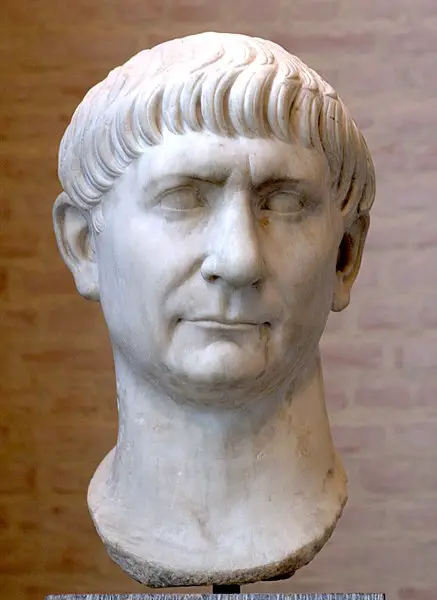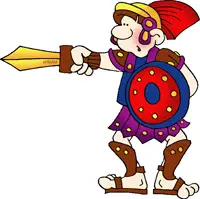Trajan
Trajan is thought of as one of the best Roman Emperors of all time. He reigned from 98 C.E. until his death in 117 C.E. Trajan was an emperor-soldier. He helped expand the Roman Empire through his conquests of new territory.

During his reign, Rome was very prosperous. Trajan brought a time of internal peace for the Roman Empire and the surrounding Mediterranean Sea region. He was the second of the Five Good Emperors to rule the Roman Empire.
Childhood
Trajan was born during 53 C.E. in Italica, a small town near Seville in Hispania or Present-day Spain. He was born an Italian citizen to Marcus Ulpius Trajanus.
Trajan’s father served Vespasian as a commander during the Jewish-Roman War. His mother was Marcia, who was the sister-in-law of Roman Emperor Titus of the Flavian Dynasty.
Not much is known of Trajan’s youth. Scholars believe he traveled much around the Roman Empire while his father was in the Roman army.
He probably spent time in Spain, the city of Rome, and other parts of the Roman Empire.
Joining the Roman army
Trajan joined the Roman army and followed in his father’s footsteps. He rose through ranks quickly. He served in many areas of the Roman Empire’s frontier that were dangerous.
During 76 C.E., his father was named the Governor of Syria. At this time, Trajan served as a tribune beneath his father. He also commanded the Roman Seventh Legion in the region.
When his father was replaced in 77 C.E., Trajan transferred to a Roman province in the Rhine region.
Trajan was recognized by Roman Emperor Domitian in 85 C.E. and was named praetor for his military service.
In 86 C.E., his cousin passed away and left two young children named Hadrian and Paulina. Trajan and a friend agreed to raise the two children.
Rise to power
Trajan was elected consul in 91 C.E. This was a major accomplishment given his age of 38 years old. Trajan’s father had held the position of consul too.
His father’s success in helping the Flavian Dynasty come to power was instrumental in Trajan becoming consul. Trajan married Pompeia Plotina. Their marriage never produced any children.
When Domitian was murdered in 96 C.E., Nerva became the new Roman Emperor. Nerva was not popular with the Roman army. He felt the need to gain support from Trajan and his legions of men.
Nerva decided to give the governorship of Upper Germany to Trajan. One year later, Nerva sent Trajan a note that made Trajan his adopted son and next in line to the throne.
Becoming Roman Emperor
Nerva died in 98 C.E. while Trajan was in Upper Germany. Trajan did not return to Rome right away. Instead, Trajan chose to visit his troops to ensure their loyalty to him. He also eliminated any type of problem by executing soldiers still loyal to Domitian.
Trajan entered the city of Rome in 99 C.E. He was immediately made Roman Emperor by the Senate. After Trajan was made emperor, he went to work to strengthen government and public welfare.

He constructed new roads, buildings, aqueducts, and public baths. Trajan made policies to take of poor children, and he eliminated treason trials started by Domitian and allowed exiles to return to Rome.
Military Campaigns
Trajan is often referred to as a soldier-emperor. He had superb military skills. One of his first campaigns in 101 C.E. was to conquer the Dacians along the Danube River.
Trajan returned to Dacia in 105 C.E., and when finished, the territory was added to the Roman Empire. Trajan celebrated this victory by holding numerous gladiatorial games in Rome that involved 10,000 gladiators.
He also built two structures to honor himself named Trajan’s Column and the Forum of Trajan in Rome.
At the same time, the king of Nabatea died. The king had left his holdings to Trajan, which increased the Roman Empire once again.
The territory gained from this gift included parts of present-day Jordan and Saudi Arabia. Next up was to conquer lands in Parthia in 114 C.E. and Mesopotamia.
Under Trajan’s rule, the Roman Empire stretched from Scotland to the Persian Gulf, which was the largest expansion in Roman history.
Death
Trajan fell ill while on a military campaign in 116 C.E. His health continued to decline until his death in the summer of 117 C.E. Trajan’s body was cremated and returned to rest in Trajan’s Column within Rome.
He was succeeded by his adopted son Hadrian. After his death, the Roman Senate continued to honor him when a new emperor was placed in power.
The Roman Senate offered a prayer to all new emperors that stated: “may he be luckier than Augustus and better than Trajan.”
Important facts about Trajan
- Trajan was born during 53 C.E. in Italica, Hispania, near current-day Seville, Spain. His father, Marcus Ulpius Trajanus, was instrumental in the rise of the Flavian Dynasty and was a superb military commander.
- Trajan entered the Roman army as a young man. He was a commander while his father was the governor of Syria. His first political post was tribune for his father.
- He was recognized by Roman Emperor Domitian for military actions and was appointed a praetor.
- Trajan adopted the two children named Hadrian and Paulina upon the death of his cousin in 86 C.E. Hadrian would later become the successor to the throne.
- In 91 C.E., he was made consul by Domitian. Trajan was very popular with his troops.
- Trajan became the heir to the throne when he was adopted by Roman Emperor Nerva in 97 C.E. after receiving the position of governor of Upper Germany.
- Trajan became emperor upon the death of Nerva. He was the second of the Five Good Emperors.
- While he was emperor, Trajan expanded the Roman Empire to include lands in Scotland in the west to Mesopotamia in the east. Trajan is considered a soldier-emperor for his military skills.
- He constructed many roads, buildings, bathhouses, and temples, including the Forum of Trajan and Trajan’s Column. Trajan also supported programs for the public, especially poor children.
- When he died on campaign in 117 C.E., his adopted son Hadrian succeeded Trajan.
Questions
What dynasty in Rome did Trajan’s father help to the throne?
Flavian Dynasty
Trajan was the second of what emperors?
The Five Good Emperors
What significant structures did Trajan build while he was the Roman Emperor?
Trajan’s Column and the Forum of Trajan
Which Roman Emperor adopted Trajan in 97 C.E.?
Nerva
Trajan was considered to be what type of Roman Emperor?
Soldier-emperor



